Joseph Badger (c. 1707–1765) was a portrait artist in Boston, Massachusetts, in the 18th century. He was born in Charlestown, Massachusetts, to tailor Stephen Badger and Mercy Kettell. He "began his career as a house-painter and glazier, and ... throughout his life continued this work, besides painting signs, hatchments and other heraldic devices, in order to eke out a livelihood when orders for portraits slackened."[1] In 1731 he married Katharine Felch; they moved to Boston around 1733. He was a member of the Brattle Street Church.[1] He died in Boston on May 11, 1765, when "on Saturday last one Mr. Badger, of this Town, Painter, was taken with an Apoplectic Fit as he was walking in his Garden, and expired in a few Minutes after."[2] Works by Badger are in the collections of the Worcester Art Museum, the Museum of Fine Arts Boston, and Historic New England's Phillips House, Salem, Mass. While respected in his own time, subsequent scholars and connoisseurs largely overlooked Badger's significance until Lawrence Park wrote a book about him in 1918.[3]
Portrait subjects
- James Bowdoin (1676–1747), father of Massachusetts governor James Bowdoin[1]
- Elizabeth Campbell, wife of William Foye
- William Cooper (1716–1743), pastor of the Brattle St. Church, Boston
- Andrew Croswell (1709–1785), pastor of King's Chapel, Boston
- Thomas Cushing (1696–1746), speaker of the Massachusetts House of Representatives, and father of Thomas Cushing
- Thomas Dawes
- Jonathan Edwards[4]
- Josiah Flagg & Jane Flagg Greene, descendants of Jane Franklin, sister to Benjamin Franklin
- William Foye
- Esther Orne Gardner (ca. 1714-1755)[5]
- Ellis Gray (1715–1753), pastor of Old North Church, Boston
- John Haskins (1729–1814), grandfather of Ralph Waldo Emerson
- John Homans (1753–1800), doctor
- Joseph Jackson (1707–1790)
- John Larrabee (1686–1792), commanding officer of Castle William, Massachusetts[1][6]
- Rev. Dudley Leavitt (1720–1762)[7]
- Mrs. Dudley Leavitt (née Mary Pickering) (1733–1805), sister of Timothy Pickering
- Elizabeth Marion (1721–1746), wife of William Story, and grandmother of Joseph Story
- John Marston (1715–1786), proprietor of Boston's Bunch-of-Grapes tavern during the Revolution
- Lois Orne, wife of William Paine (physician)[1]
- Rebecca Orne[8]
- Thomas Prince
- William Scott, shoemaker, Boston[9]
- Elizabeth Storer, wife of Boston merchant-shipowner Isaac Smith (1719–1787)[10][11]
- William Tyler (1688–1758), business partner of Thomas Hancock
- Cornelius Waldo (1684–1753)[1]
- George Whitefield[12]
Image gallery
 John Haskins, 1759 (Brooklyn Museum)
John Haskins, 1759 (Brooklyn Museum)_-_Joseph_Badger_-_overall.jpg.webp) Mrs. John Haskins (née Hannah Upham), 1759 (Brooklyn Museum)
Mrs. John Haskins (née Hannah Upham), 1759 (Brooklyn Museum)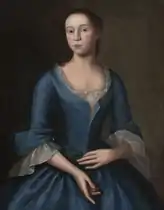 Portrait of Elizabeth Storer, ca. 1746 (Museum of Fine Arts, Boston)
Portrait of Elizabeth Storer, ca. 1746 (Museum of Fine Arts, Boston) Portrait of Cornelius Waldo, 1750 (Worcester Art Museum, Massachusetts)
Portrait of Cornelius Waldo, 1750 (Worcester Art Museum, Massachusetts)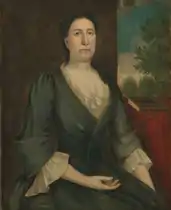 Portrait of Elizabeth Campbell, ca. 1750 (Museum of Fine Arts, Boston)
Portrait of Elizabeth Campbell, ca. 1750 (Museum of Fine Arts, Boston)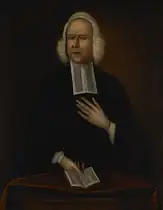 Portrait of George Whitefield, ca. 1750s, attributed to Badger (Harvard University)
Portrait of George Whitefield, ca. 1750s, attributed to Badger (Harvard University)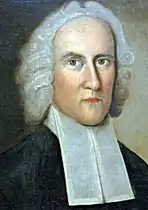 Detail of portrait of Jonathan Edwards (Yale University)
Detail of portrait of Jonathan Edwards (Yale University)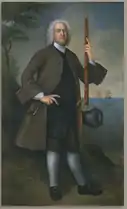 Portrait of John Larrabee, ca. 1750 (Worcester Art Museum, Massachusetts)
Portrait of John Larrabee, ca. 1750 (Worcester Art Museum, Massachusetts)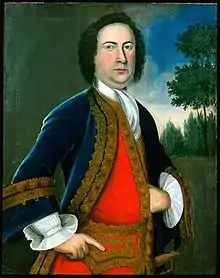 Portrait of William Foye, Jr., ca. 1750 (Museum of Fine Arts, Boston)
Portrait of William Foye, Jr., ca. 1750 (Museum of Fine Arts, Boston)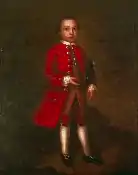 Portrait of Thomas Dawes, ca. 1764
Portrait of Thomas Dawes, ca. 1764
References
- 1 2 3 4 5 6 Lawrence Park. Joseph Badger (1708-1765): and a descriptive list of some of his works. 1918
- ↑ Boston Evening Post, 05-13-1765; p.3., center column, roughly ⅔ down
- ↑ Meschutt, David (July 2004). Park, Lawrence (1873-1924), art historian. New York: Oxford University Press. doi:10.1093/anb/9780198606697.article.1401139.
- ↑ Yale Bulletin Archived 2009-04-18 at the Wayback Machine. 2003
- ↑ Smithsonian
- ↑ Worcester Art Museum
- ↑ Joseph Badger and His Work, Proceedings of the Massachusetts Historical Society, Volume 51, Massachusetts Historical Society, Published by the Society, Boston, Massachusetts, 1918
- ↑ In the portrait of Rebecca Orne as a child in the Worcester Art Museum, the sitter holds a squirrel. Badger incorporated an emblematic squirrel into some of his portraits; he "would seem to have the claim to primacy" of what later became a hot trend in colonial portraiture, common in the work of his contemporary John Singleton Copley. Cf. Roland E. Fleischer. Emblems and Colonial American Painting. American Art Journal, Vol. 20, No. 3 (1988); p.26
- ↑ Susan Rather. Carpenter, Tailor, Shoemaker, Artist: Copley and Portrait Painting around 1770. Art Bulletin, v.79, No. 2, June 1997; p.288
- ↑ Museum of Fine Arts, Boston
- ↑ Massachusetts Historical Society. "Smith-Townsend Family Papers and Papers II".
- ↑ Portrait of Whitefield, ca. 1750, attributed to Joseph Badger. Harvard University Portrait Collection.
Further reading
- Lawrence Park. Joseph Badger (1708-1765): and a descriptive list of some of his works. 1918.
- Portrait of Jeremiah Belknap by Joseph Badger. Bulletin of the Cleveland Museum of Art, Vol. 6, No. 7/8 (Sep. - Oct., 1919), pp. 123–125.
- The Orne Portraits by Joseph Badger. Worcester Art Museum Bulletin v. 1, no. 2, Feb. 1972.
External links
- Joseph Badger at American Art Gallery
- WorldCat. Badger, Joseph 1708-1765
- Worcester Art Museum, Worcester, Massachusetts. Joseph Badger (1707/8–1765).
- Smithsonian American Art Museum. Inventory of works by Badger.
- Butler Institute of American Art, Youngstown, Ohio. Joseph Badger.
- Cleveland Museum of Art. Portrait of Jeremiah Belknap, ca. 1758.
- John Singleton Copley in America, a full text exhibition catalog from The Metropolitan Museum of Art, which contains material on Joseph Badger (see index)